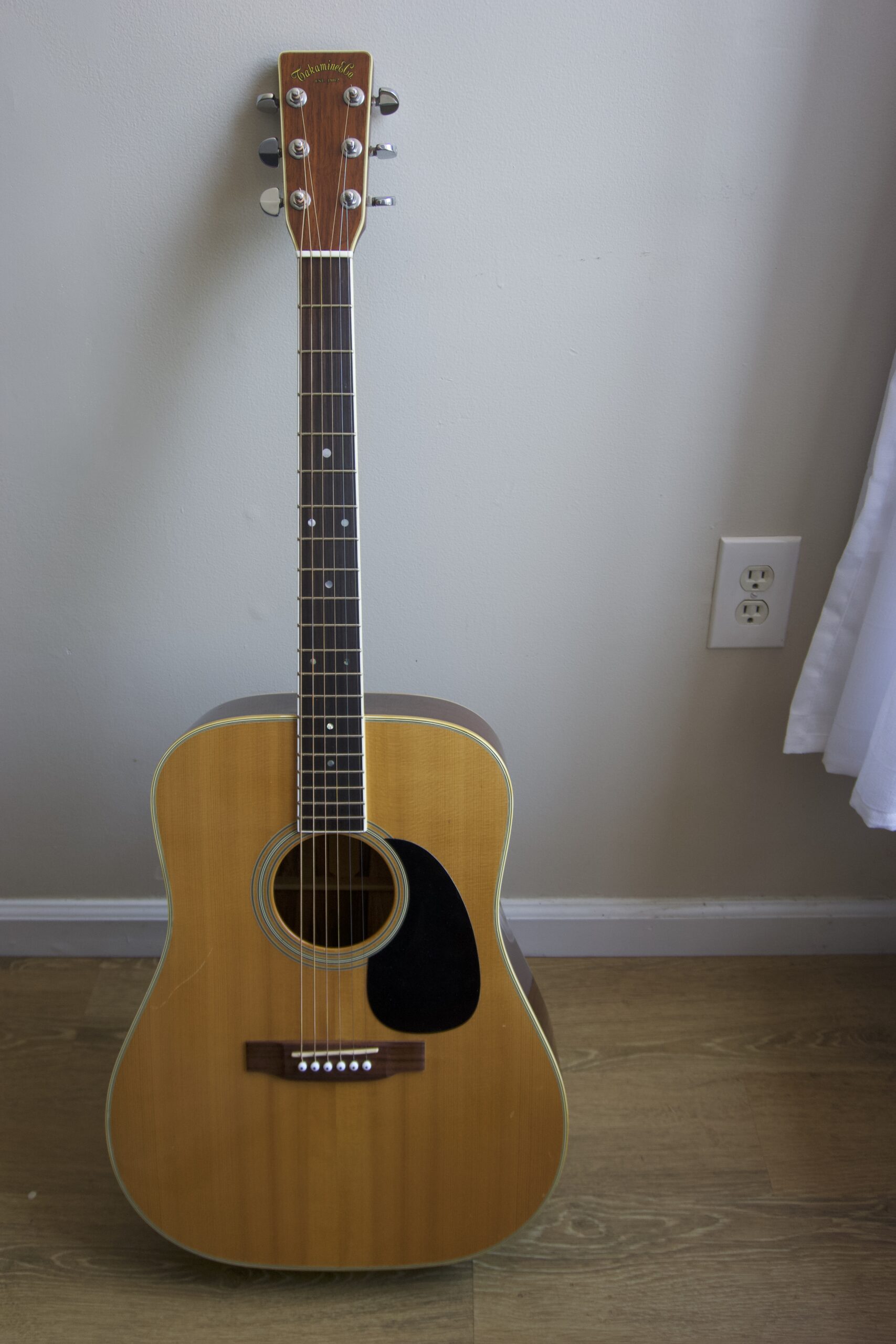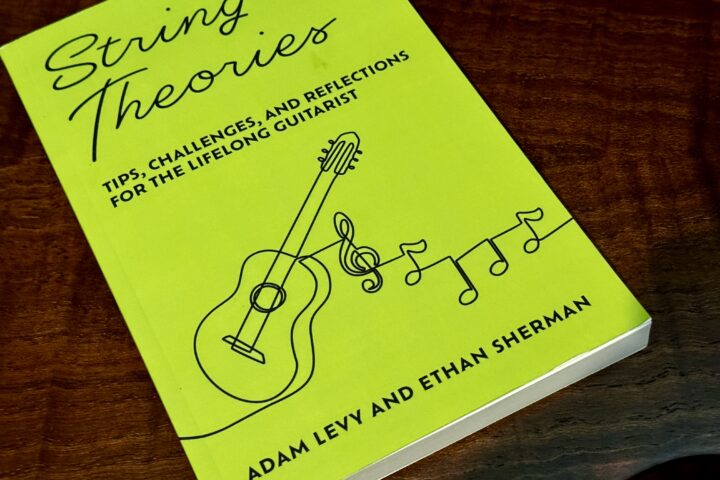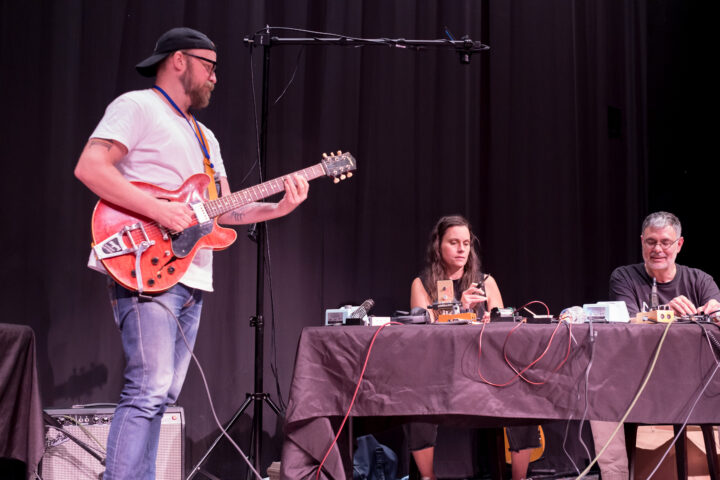Having first learned of guitarist and composer Gregg Belisle-Chi during his time at Cornish College of the Arts (just up the hill from FJ HQ in Seattle), it’s safe to say that we at the Fretboard Journal are long-time fans. 2019 and 2020 saw the release of Book of Hours and ensō respectively, both excellent and deeply considered albums that helped Gregg rightly claim his place within the landscape of contemporary guitar. As much as we loved those, his latest release, Koi (released June 13th via Bandcamp), has blown our minds. Gregg’s ample skill is now being deployed not as a composer and player of his own work, but as an interpreter and decoder of one of the most original voices in modern music, saxophonist and composer Tim Berne.
Though we’ve had a peripheral awareness of Tim’s work for some time, it was Gregg’s interpretation of this seemingly space-age music that brought everything together for us. Though it might not be the perfect fit for dinner parties, we encourage readers to take the leap and listen to this truly remarkable collection of work. While it may be tough the find “the 1,” we found it to be the perfect catalyst to contemplate the conventions of composition, and also to consider the limits and unimagined potential of the solo acoustic guitar.
Fretboard Journal: Getting right to it, I think a good place to start would be to give readers some insight on just who Tim Berne is. As adventurous as some of our readers might be, odds are that guitar players reading may not know of Tim’s work. How did you become aware of him and his material? And how did you became inspired to cover it?
Gregg Belisle-Chi: I became aware of his music while I was in college at Cornish College of the Arts. At that time, everyone was really into Snarky Puppy, Esperanza Spalding, or whatever was jazz popular in 2008. Looking back, I was searching for and was more interested in something else… that was a little more of an invitation to a kind of alternative musical lifestyle. Tim’s whole thing has always been really, really unconventional and unique. Very personal. Kind of hard edged. So it quickly became very important to me to investigate his music as much as possible. It was exactly what I was looking for at that time.
I’ve always loved his writing, his improvising, and I love the guitar players he plays with. There’s some incredible records with Nels Cline, he had a really great record with Bill Frisell, just the two of them, and also records with Marc Ducret and David Torn. I was hooked pretty early on. All the musicians that he plays with – all these musicians that have circled themselves around him – have all been really, really influential and inspiring to me. And it all seems to be on the “left side” of jazz, a different kind of improvising language than what’s traditionally associated with whatever that word means.
FJ: The language of it… I keep coming back to that. I’m looking for a starting point for how best to start my thinking about it, because as I listen to it, it has the interesting quality of simultaneously being impossible to imagine him creating it, but it still has a relatability factor to it. I don’t really know how best to place it. I guess I’m still grasping at straws in terms of what it even is. How do you think about the language of it all?
GBC: Honestly, I can’t really say either. I’m really hesitant to put any kind of definition on it because he’s one of the few people who’s really just invented his own musical language that can’t be replicated. Just the way that he writes melodies, harmony, the way that he writes counterpoint specifically… it doesn’t acknowledge traditional harmony in any specific way but it’s sprinkled in there just enough, like you were saying, as something that you can latch onto.
FJ: As I was fist listening to the record, I’d see a song title and my impulse was to track it down, listen and compare it the original, but as I’d try to find the material it was nowhere to be found, at least on streaming platforms. Can you give us a bit of context? Is the material covered representative of his entire career, or a recent chapter of it?
GBC: Most of his music isn’t on streaming platforms, which I think is good. As far as I know, it’s mostly on Bandcamp… or in used CD sections throughout the US. In terms of the material I recorded, there’s some new pieces that hadn’t yet been recorded, but I think a majority of them were from a duo record that he did with the pianist, Matt Mitchell, which is called Angel Dusk. Another piece was from the early 2000s, a record he did with Ducret, Craig Taborn, and Tom Rainey called Science Friction, which is one of my all-time favorites of his. This piece, “Huevos” that I recorded, it’s actually just the tag ending of the first track on that record… something like 12 bars of music.
But I think majority of the songs I recorded were from that duo record with Matt. I’ve had that record for a long time. Tim sent me the scores. They’re all written for saxophone and piano. Just two voices, treble clef and bass clef, so I just squashed it all onto one stave for solo guitar.
FJ: And when you get the scores for music like this, do you think, “I know what to do with these” or is it like you’re receiving an alien transmission? I’m asking for all the guitar players out there who wouldn’t know where to begin.
GBC: Originally, when he sent me the scores, I almost wanted to treat them like classical pieces. I’ve learned some of the Bach lute pieces and I have a lot of fun learning that kind of music so I thought I’d try to replicate that approach with Tim’s compositions. So, playing them in time and really honoring the way that they were originally recorded. But I also wanted to improvise somehow. So the process was really a lot of deconstructing his pieces, rather than treating the compositions like a song form. It wasn’t about improvising over it like on a jazz standard where there’s a set form and you’re going from A to B and back and forth. It was more like approaching each piece elementally. Melodic motifs, gestures, ideas, extrapolating as much music out of the compositions as I could, and then try to put it all together into one coherent piece of music.
I just explored every nook and cranny of his songs. That’s what it turned into, and luckily that’s what Tim wanted. He really wanted me to get in there and, in his words, “fuck it up.” He always encouraged me to try to find a way to get myself into the song rather than just letting the song play me, if that makes sense.
FJ: When did all this start? When did you and Tim meet?
GBC: It started in the summer of 2020, in the midst of the pandemic. I was kind of floundering, looking for things to do. I wasn’t really making my own music, and I didn’t really know what I was trying to do, musically. I was feeling fairly uninspired to write my own stuff so I just decided to tackle somebody else’s music for a while. I’ve been a fan of Tim’s music for a long time and I’m always trying to get a deeper understanding of it, because some of it is so alien and you just don’t know where it comes from.
Tim had released a solo saxophone record called Sacred Vowels that summer and I just started transcribing it for the challenge. My idea was that… I’m always trying to understand his music; melodically, harmonically, rhythmically. So what better way than to transcribe a whole record of just melodies?
I really only meant to do a handful of them. I thought, because it’s solo saxophone – only one voice – that would be the clearest way getting into how he writes melodies. After that, I would dive into how he writes harmony. So I started learning them, recording them and posting them on Instagram. Tim saw one and he totally freaked out. He was really into it. I did a handful more and he was really psyched. So, he asked me to transcribe the whole record. So I transcribed the whole thing, notated it, and we released it as a score book.
He was really attracted to the sound of his music on the acoustic guitar, so he started sending me his sheet music and I started messing around with it, some solo guitar arrangements, and he floated the idea of doing a solo record. I wasn’t really sure how serious he was, but by this time it was winter, I found myself with an abundance of time and I just said, “Fuck it, maybe this is the perfect opportunity to work on something like this.”
So, I just compiled a pile of his music that I thought would be playable on the guitar. I went through dozens of his records trying to find things that I thought could be played solo guitar. I started recording them at home, emailing him takes.
He’d call about 20 minutes later and give me suggestions or we’d talk about different approaches. We’d work on a song for about a day or two, back and forth like that. This was all between December and January. I’d never had the opportunity to work on a record like that, it was a really fun and unique experience.
It was like, he was remote producing from his place in Gowanus and I was working it all on my own time. I was able to spend all day on just one thing… which is not really the model of recording jazz and improvised music. Nobody can afford to go into the studio for a month! So was a real gift to be able to just work on that music with no time restrictions.
FJ: In terms of recording, you recorded at home and then mixed it after the fact?
GBC: Yeah, so I recorded at home using a pair of Neumann KM-184s that Reid Anderson let me borrow, straight into Logic. After that, I sent everything to David Torn who mixed and mastered the whole thing.
There are a few songs wherein you can hear my heater clicking on. I don’t have a chair in my apartment that doesn’t squeak, so between the occasional clicks and squeaks, there’s some good situational charm to it. Our apartment is a bit on the noisy side, but we did the best we could. The guitar that I was using was totally fucked up, too.
FJ: Talk about that! What guitar did you use, and was it just one?
GBC: The guitar is a 1970s Takamine lawsuit guitar that was, at the time, in really, really terrible condition. The action was so, so low, which can be great, but this was really pushing the boundaries of what’s useable in terms of low action. Because it was winter, and the temperature was always fluctuating between the cold outside and the heater in the apartment, it was really difficult to keep the guitar stable and in the same place.
Somehow I managed to get a decent sound out of it, despite everything. I recently took it to a luthier who said, “I have no idea how you were ever able to play this instrument.” It was in that bad of condition. I don’t really know the specifics, but all this is to say it wasn’t pretty.
The guitar was given to me as a wedding present in 2014 by my very good friend Chris Symer. I hadn’t owned a good acoustic instrument before that, and even after having it for so many years… I hadn’t really done much recording with it.
Since making this record, I’ve started thinking about playing the electric guitar differently. With the acoustic, you have to be in total control of the sound and the envelope of the notes. There’s a resonance to it. On the electric, you can kind of get away with things like using reverb or an amplifier. But with the acoustic guitar, there’s nothing that you can do to affect the sound except with your hands.

FJ: Looking to the future, now that the record’s out and with things loosening up and seemingly coming back to life, I’m wondering what’s next? I saw you and Tim making the rounds recently for PR and playing the music together for radio, and it’s really amazing. This is the perfect duo to be able to do some touring and play at festivals where people would listen with focus. Will you guys do any touring, or is it too soon to tell? And if touring is still in limbo, is there more writing and collaboration on the horizon?
GBC: We were actually just in the studio. We recorded a duo record last month, and that’ll be released on Intakt early next year, I think January or February. In terms of touring or shows, it’s still too soon to tell. I know live performances are happening which is great but we’re being cautious in terms of planning and managing expectations around travel specifically.
FJ: Well, we’re really hoping we get to see you guys live before too long. We really love the record and know our readers will, too, at least those who’re up for the journey.
GBC: Ha! We certainly hope someone out there gets it. Thanks so much.
Order Koi via Screwgun Records’ Bandcamp page here.



